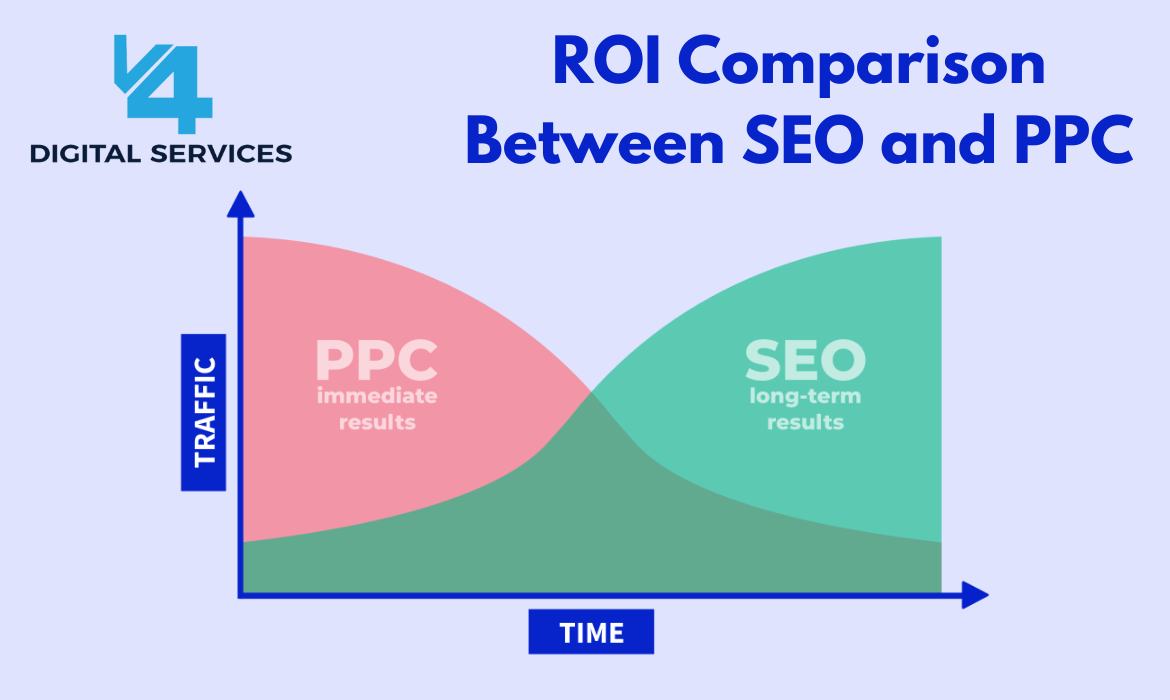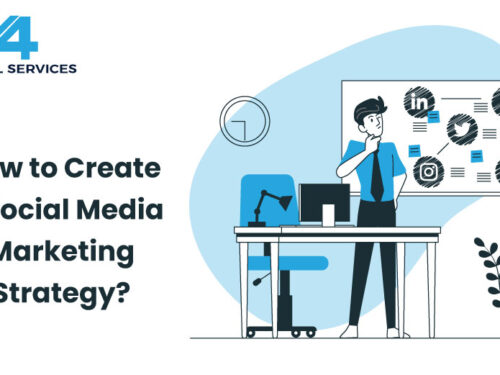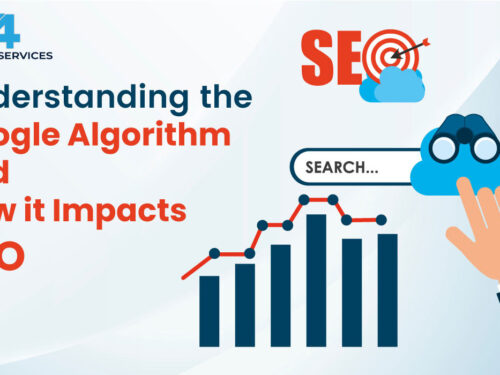ROI Comparison Between SEO and PPC
Search engine optimization and pay-per-click advertising are two very popular ways to get more business, but what is a good ROI percentage for SEO? and which one will help your business grow faster? The answer to this question is more complex than you might think because both strategies have benefits and drawbacks. So, here’s an in-depth look at the differences between PPC and SEO and whether one or the other could be right for you.
What is Pay Per Click (PPC)?
Pay-per-click advertising, also known as PPC, can help you to attract new customers by targeting people who are likely to be interested in your products or services. It’s easy to get your ads in front of potential customers and see results immediately. With a few clicks of the mouse, you can set up your campaign and get started right away. You don’t need any special knowledge about internet marketing. You choose which search engine you want to advertise on, how much you’re willing to spend each day, and what ad type you want (text ad or banner), and then pay Google when someone clicks on your advertisement.
The Advantages of PPC
- PPC can be tuned to target specific keywords, which ensures that your ads are relevant to the content of your website.
- It’s easier to track conversions and ROI with PPC than with SEO. You can also use conversion tracking codes to determine the success of different campaigns.
- You get instant ad feedback, so you know what’s working and what isn’t as quickly as possible.
- PPC allows you to place bids based on either daily budget or cost per click (CPC). A CPC bid sets an absolute maximum amount spent each day, while the daily budget establishes an upper limit for spending.
- Your Ad Rank is determined by three factors: Quality Score, click-through rate (CTR), and relevance score.
The Disadvantages of PPC
- Many ads are ignored by potential customers, who have grown accustomed to seeing them.
- There’s no guarantee that your ad will be seen, even if you pay more.
- It can take a lot of work to determine which keywords drive traffic and conversions.
- You may compete with other businesses in the same industry, making it harder to rank on search engines.
- PPC campaigns have deadlines, so you’ll need to monitor your campaigns and adjust accordingly.
What is SEO (Search Engine Optimization)?
SEO (Search Engine Optimization) is the process of optimizing your website to rank higher in organic search engine results. This can be accomplished through organic and inorganic ways, such as link building, content creation, and keyword optimization. SEO’s main goal is to rank on the first page and continue ranking high on those pages to generate qualified traffic.
Therefore, SEO should be viewed as an investment that pays off with time and effort. On the other hand, PPC advertising will only result in instant traffic if you have enough budget to get ads shown at all times.
Advantages of SEO
SEO brings more qualified traffic to your website. It takes time and patience, but the results are worth it. Plus, with the rise of voice search, having great content on your site will be even more important in the future. When customers look up something they need or want by speaking into their phone, they’ll want sites with good content written specifically for that type of search.
With that being said, many different types of websites require different strategies when marketing them online. For example, a site built with WordPress and WooCommerce may need SEM to get customers interested in their products while targeting potential leads who have never heard of your business.
Disadvantages of SEO
- Requires long-term commitment and patience to see results
- It can’t be scaled
- Doesn’t work on sites that don’t have high-quality content or links and doesn’t drive traffic directly to the site as PPC does. The same thing can be said of AdWords.
Many things can go wrong with this type of marketing campaign, so it’s important to know what you’re doing before you get started. If your SEO strategy doesn’t sound as good as your PPC strategy, it might not be worth your time.
However, SEO is a better investment than PPC if you’re in a competitive market because it could drive more targeted traffic to your website over time.
How to calculate the cost-efficiency of SEO?
Cost efficiency can be calculated by dividing the total revenue gained from the marketing budget by the total budget. You’ll want to do this calculation separately for each marketing channel you use and then compare them to get an idea of which is more cost-effective.
ROI Comparison Between SEO and PPC
The answer to the question of which marketing technique is better depends on your goals. For example, if you have a product that needs to sell fast and you need people searching for it right now, then pay-per-click (PPC) ads might be more effective. On the other hand, if you have time to build awareness and increase your website’s authority before your product launches, then search engine optimization (SEO) is more beneficial. You can also make the ROI Comparison Between SEO and PPC, or compare the two techniques by measuring return on investment (ROI).
ROI is calculated by dividing the net profit from a particular campaign by the total amount spent generating those profits. In this case, many factors go into determining ROI, such as the number of new leads generated and the average lifetime value of each customer. Therefore, to make an accurate comparison between SEO and PPC, you will want to research both types of campaigns and how they will impact your business.
Why Use Both for Best Results?
You must have SEO and PPC on your radar to get the most out of your marketing campaigns. The beauty of both methods is that they provide different information. With SEO, you look at how well your content will rank organically in search engine results pages, while with PPC, you look at how many people will click on your ad and be brought directly to your website. Both methods can benefit each other by boosting one another’s effectiveness.
For example, if you have an excellent ranking on Google, but nobody clicks on your ads, it might be time to re-evaluate your current PPC campaign. If you see good traffic numbers but low conversions (purchases), then it might be time to try some new tactics in organic search rankings. By running them concurrently, you’ll always be able to find the best strategy for your business and take advantage of opportunities as they come up.
Conclusion
In conclusion, SEO and PPC are vital to the success of your business. It’s important to understand well how to calculate ROI for SEO From Keywords You’re Targeting. The best action may be to invest in both and see which yields better results. Try to avoid getting too caught up in one strategy at the expense of another since this will only cost you money.
Start by using a good budget per month for each strategy. Then, over time, continue increasing your budget on whichever is performing better while decreasing your budget on the other until you reach the point where one is clearly outperforming the other. Alternatively, continue increasing budgets until you find out which strategy gets you better results.





Most of the themes required tons of plugins to make the site looking like the demos. But not and this theme. The developer makes this theme working only with 4-5 necessary plugins. The other big advantage is that regular updates keep compatibility with all plugins.